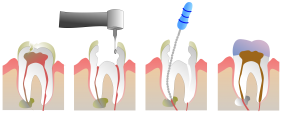Root Canal In NYC
What is a Root Canal?
A “Root Canal” is a dental procedure performed when the nerve of the tooth becomes infected or the dental pulp becomes damaged. Endodontics is the dental specialty concerned with the study and treatment of the dental pulp. Root canal treatment aka endodontic therapy, although a relatively painless procedure, has come to have a rather unpleasant connotation. Root canal procedures include removing the nerve as well as the dental pulp and the inside of the tooth is cleaned and sealed. Root canal therapy is a treatment used to repair and save a tooth (or teeth) that is (are) infected or badly decayed.
Why Should I Get a Root Canal?
Before the root canal, pain associated with infected and decayed teeth can be excruciating. Common causes of tooth decay and infections are eating foods that might not be good for your teeth, gums or mouth as well as not brushing or flossing daily.
- Toothaches including dental cavities, dental abscess, and gum disease,
- Irritation of the tooth root, cracked tooth syndrome, temporomandibular disease (tmd), impaction, or an eruption.
How To Prepare For a Root Canal Procedure
Before the root canal, pain associated with infected and decayed teeth can be excruciating. Some people will experience a toothache that may develop over days and weeks. A dental evaluation by the dentist in our New York City dental office will help diagnose whether you need immediate treatment or a more involved procedure that has to be scheduled.
- A comprehensive dental exam will be done including dental X-rays taken and models made of your teeth and mouth. You also may need a special type of computed tomography (CT) scan, that will allow the dentist to accurately measure the height and width of your existing bone to evaluate the health of your teeth and jaw bone.
- Treatment plan. 212 Smiling will tailor a treatment plan to account all factors of the procedure. If the surgery is invasive we will take into account the factors and the procedure with a timely thought out plan. This will include a walkthrough of the procedure, a step by sept treatment guide and a follow up an appointment if needed.
Make sure to tell your doctor about any medical conditions and any medications you take, including prescription and over-the-counter drugs and supplements. If you have heart conditions or orthopedic implants, your doctor may prescribe antibiotics before surgery to help prevent infection.
Anesthesia may be used to control the pain during your procedure. The 212 Smiling team will instruct you about eating and drinking before surgery, depending on the type of anesthesia. If general anesthesia is used, someone will have to assist you home after surgery and expect to rest for the day.
What a Root Canal Procedure Looks Like
Before the root canal, pain associated with infected and decayed teeth can be excruciating. Some people will experience a toothache that may develop over days and weeks. A typical root canal procedure may look something like this…
- Your dentist will use anesthesia to numb the tooth. Once, the tooth is numb, a dental dam might be used to keep the tooth clean and dry during the procedure.
- Your dentist will then use a small drill, to create an opening in the top portion of the tooth. Next, the dentist will use small files to clear away the damaged and diseased pulp from the inside of the tooth to shape the inner chamber of the tooth and root. Your dentist may put an antimicrobial solution in the chamber to kill any bacteria and reduce the risk for further infection.
- Once the chamber is cleaned and dried, a rubber-like material called gutta will be used to fill the chamber. Your dentist will close the opening in your tooth with a temporary filling
- Within a few weeks, your dentist will finish the treatment by placing a permanent crown or a similar type of restoration on the top of the tooth.

After The Procedure
After a root canal, you may experience some of the typical discomforts associated with any type of dental procedure, such as:
- Minor bleeding
- Swelling
- Bruising
- Pain or discomfort
If swelling, discomfort or any other problem gets worse after surgery, contact your dentist as you may need pain medications or antibiotics. You may need to eat soft foods while the procedure site heals. Typically, your dental surgeon or dentist will use stitches, if invasive, that dissolve on their own, but if not your dental surgeon or dentist will have to remove them.


